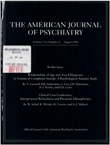Clinical effects of clozapine in chronic schizophrenia: response to treatment and predictors of outcome
Abstract
OBJECTIVE: This study addressed the unique clinical properties attributed to the atypical antipsychotic clozapine, including its efficacy in patients with treatment-refractory psychosis and against negative symptoms, its lack of acute extrapyramidal side effects, and the longer time course of its therapeutic effects. METHOD: The clinical responses of 84 schizophrenic inpatients (66 with treatment-refractory illness and 18 who were intolerant of antipsychotic treatment) were examined. After all previous antipsychotic medications had been withdrawn, the patients were treated with clozapine according to a standardized titration and dosage schedule. Patients who tolerated and responded to treatment were discharged and maintained on a regimen of clozapine for up to 52 weeks. Patients were evaluated for behavioral response and side effects after weeks 3, 6, 12, 26, 39, and 52 of treatment. RESULTS: Fifty percent of the patients with treatment- refractory illness and 76% of the treatment-intolerant patients responded to clozapine in up to 52 weeks. The optimal period for a trial of clozapine appeared to be 12-24 weeks. Clozapine exhibited therapeutic effects on negative symptoms, but these were not clearly independent of its effects on positive symptoms and extrapyramidal side effects. Several variables, including early age at onset of illness and female gender, were found to be predictors of poor response to treatment. Predictors of good response included the presence of extrapyramidal side effects during previous treatment with classic neuroleptics and a diagnosis of paranoid schizophrenia. CONCLUSIONS: These findings have important implications for the use of clozapine and our understanding of the pathophysiology of treatment-resistant schizophrenia.
Access content
To read the fulltext, please use one of the options below to sign in or purchase access.- Personal login
- Institutional Login
- Sign in via OpenAthens
- Register for access
-
Please login/register if you wish to pair your device and check access availability.
Not a subscriber?
PsychiatryOnline subscription options offer access to the DSM-5 library, books, journals, CME, and patient resources. This all-in-one virtual library provides psychiatrists and mental health professionals with key resources for diagnosis, treatment, research, and professional development.
Need more help? PsychiatryOnline Customer Service may be reached by emailing [email protected] or by calling 800-368-5777 (in the U.S.) or 703-907-7322 (outside the U.S.).



